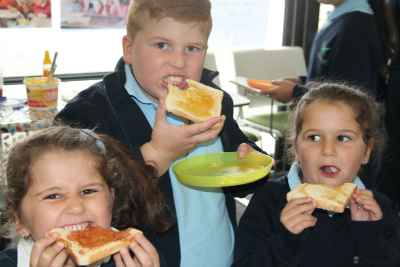 They’re in different suburbs and have different challenges with students, but both are committed to making sure their kids have something in their tummy before they hit the classroom.
They’re in different suburbs and have different challenges with students, but both are committed to making sure their kids have something in their tummy before they hit the classroom.
Coburg Special Development School and William Ruthven Primary are two of 500 schools in Victoria helping to feed 25,000 kids so they are ready to learn. Between them the two schools in Melbourne’s northern suburbs provide breakfast five days a week for 70 to 80 students, helping them be ready for a day of learning.
Coburg SDS has a roll of 62 students with 35 to 40 students participating in the program most days. Principal Justin Esler says each class runs their own Breakfast Club from their own classroom; helping to meet the needs of each individual child.
“What makes our club a bit different is that it is also a real ‘time of learning’ where daily living, communication and social skills are taught to our students.”
It has been estimated that one in seven Victorian children arrive at school hungry, affecting their ability to learn and do their best. The Victorian Government has invested $13.7 million in Breakfast Clubs to address this disadvantage and ensure kids have the start they need.
The Government’s Education State target of Happy, Healthy and Resilient Kids also recognises that the healthy development of students helps to drive the future prosperity of Victoria.
William Ruthven School principal Allan Waterson says there is no denying students perform better on a full stomach. "It gives them a settled start to the day, allows them to engage and participate and make the most of the opportunities the school years offer.
”Victoria’s School Breakfast Clubs Program is run in partnership with Australia’s largest welfare food agency, Foodbank, using its existing warehousing, storage and freight network to help distribute the hundreds of tonnes of food involved.
Food is purchased from a network of key suppliers at wholesale prices. The food is sorted at Foodbank’s central warehouse, and trucks transport the required amount of breakfast items to participating schools.
As featured in Leader Newspapers on 8 May, 2017.